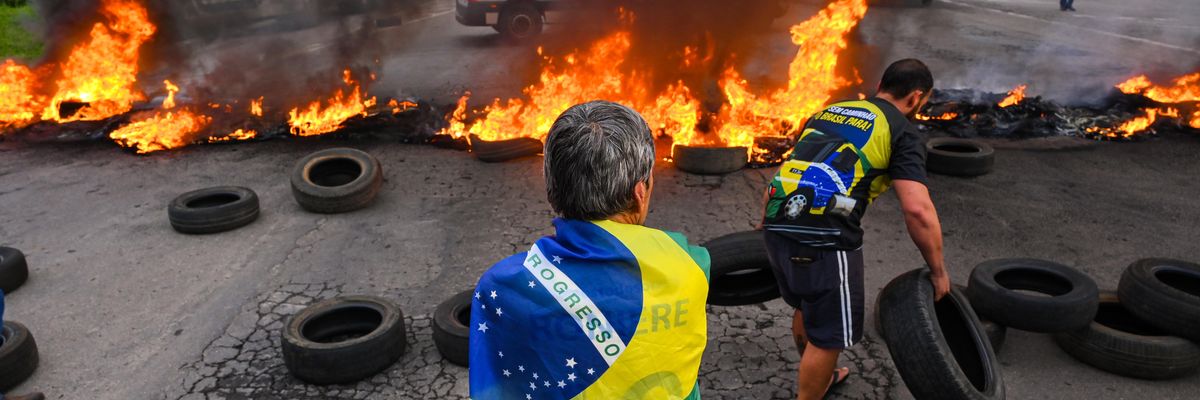Ahead of reports that Brazilian President Jair Bolsonaro is imminently expected to end his silence and accept defeat at the hands of leftist Luiz Inacio Lula da Silva, backers of the far-right incumbent blocked hundreds of roads across the country on Sunday and Monday--an early indicator of a potentially fraught two-month presidential transition period.
By Monday night, pro-Bolsonaro truck drivers and other motorists had set up 342 roadblocks, BBC News reported, citing federal police data. According to the news outlet, "Blockages were reported in all but two states, causing considerable disruption and affecting food supply chains." Some flights were canceled after access to Sao Paulo international airport was restricted.
Truckers' union leaders, meanwhile, have denounced the actions of a handful of disgruntled right-wing truckers and reiterated their support for Lula, a member of the Workers' Party who began his political career in the 1970s as a metalworkers union organizer.
Wallace Landim, one of the union leaders behind the 2018 truck drivers' strike, said that the current blockades are "small, isolated, and linked to the far right," according to The Brazilian Report. "This is not the time to stop the country," he added.
In addition to erecting burning barricades on highways and blocking the port of Paranagua in Parana state, Bolsonaro supporters have also rallied outside military bases, urging the armed forces to intervene on the president's behalf.
According to Bloomberg: "Bolsonaro is meeting with heads of the Navy and Air Force at the presidential palace in Brasilia Tuesday morning, in addition to the ministers of defense, justice, and public security. Bolsonaro's chief of staff, Ciro Nogueira, and running mate in the election, General Walter Braga Netto, are also attending."
Bolsonaro has yet to concede defeat or officially challenge the results since Lula won Sunday's runoff election by more than two million votes. Lula, whose victory was immediately recognized by the United States, Russia, China, and several other countries, is set to assume office on January 1, 2023.
Citing Brazilian Communications Minister Fabio Faria, Reutersreported that "Bolsonaro will not contest his election defeat and will address the nation later on Tuesday."
In the aftermath of Lula's victory on Sunday night, "it was not clear if Bolsonaro would concede defeat, as his allies were encouraging him to do," the news outlet noted.
As BBC reported: "Combative statements from the president in the past--such as that 'only God' could remove him from office--mean there is a tense wait for him to appear in public. Before the election, he had repeatedly cast unfounded doubts on the voting system."
While law enforcement officials have cleared some roadblocks--many of which were set up immediately after results were announced--Supreme Electoral Tribunal (TSE) President Alexandre de Moraes on Monday ordered the "immediate clearance" of remaining roadblocks, teleSUR reported. "Moraes maintains that the Federal Highway Police (PRF) 'has not fulfilled its constitutional and legal task.'"
As Bloomberg reported, the judge warned of "fines reaching 100,000 reais ($19,306) per hour per vehicle and that the agency's director could be sidelined if he didn't comply."
According to teleSUR, "Moraes also asked the Justice Minister Anderson Torres, the commanders of the Military Police of 27 states, the Attorney General Augusto Aras, and the subnational prosecutors to take 'the measures they deem pertinent' to solve the problem."
During his Sunday night victory speech, Lula said that "this country needs peace and unity. This population doesn't want to fight anymore."
"I will govern for 215 million Brazilians, and not just for those who voted for me," Lula continued. "We are one country, one people, one great nation."
Lula's triumph represents a remarkable comeback for the 77-year-old former president. When he governed Brazil from 2003 to 2010, Lula channeled an economic boom into downwardly redistributive programs that curbed inequality.
Lula enjoyed approval ratings of over 80% when he left office. However, his 18-month incarceration stemming from a corruption conviction prevented him from running in the 2018 contest eventually won by Bolsonaro. Lula contended that the charges were fabricated by right-wing operatives intent on pulling off a political coup, and the conviction was later annulled by Brazil's top court, which ruled the presiding judge had been biased and conspired with prosecutors.
The president-elect has vowed to increase spending on the poor, restore relationships with foreign governments, and crack down on the illegal logging that has intensified the destruction of the Amazon rainforest during Bolsonaro's reign.

